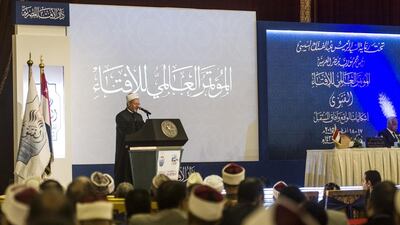Of all the ways that we can combat the extremist rhetoric of militant groups such as ISIL, marketing moderate messages through religious edicts known as fatwas is the logical place to start. Leading Muslim clerics met this week to discuss the importance of moderation in issuing fatwas to counter those that pervert ideology to falsely sanction atrocities in the name of Islam. During their meeting in Cairo, the clerics agreed to establish better coordination on issues of Islamic law.
To achieve this, fatwas should highlight moderate Islamic teachings and be expressed in a way that engages younger people who have been targeted for radicalisation. This shift has already begun. For example, six British Muslim scholars issued a fatwa last year opposing ISIL’s “poisonous ideology” and prohibiting youth from joining extremist movements in Iraq and Syria. During Ramadan, the UAE hosted a series of talks including one led by influential religious scholar Dr Usama Sayyid Al Azhari, who noted that Al Qaeda, ISIL and Boko Haram have a similar “dark philosophy with a grim vision”.
Simply taking a defensive approach is not enough. While issuing fatwas that focus on Islam’s tolerance and rejection of violence against innocent people is essential, Muslim scholars also have a duty to respond to, and refute, perverse ideologies.
For every fatwa issued by radical Islamists, there should be a counter fatwa that exposes its moral emptiness. For every website created by radical Islamists, there should be another website with a counter message. Muslims need to be more active online and be creative in showing the true face of Islam. Abu Dhabi’s Sawab Centre is already doing this, and giving a voice to the millions of Muslims who stand united against the falsehood propagated by ISIL and other extremist groups. Religious scholars play an important role in interpreting beliefs, but people at every level of society have a role in disseminating moderate messages.

